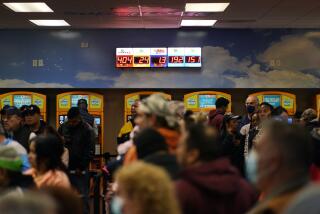Giant Jackpot Gives Germany Lotto Fever : Gambling: Strict laws of commerce are eased to accommodate demand for tickets. Prize is $25 million.
- Share via
BERLIN — In normal times, a German who plays the lottery is a pretty sedate fellow. He plunks down a little less than a dollar and takes a chance on a relatively humble jackpot, usually ranging from about $700,000 to $2.7 million.
All gambling in Germany is controlled by the government, which places tight restrictions on how Lotto, the main game, is played. Tellingly, statisticians have noticed that bureaucrats and other civil servants are drawn to Lotto in disproportionate numbers.
“A boring game for proper people,” sniffs Harry Nutt, the Berlin author of a study of gambling in Germany and an advocate of horse-race gambling. “You could say that Lotto is a ‘cold passion.’ ”
Until now.
For nine weeks, no one has correctly selected all six numbers--plus a recently added seventh “super digit”--in Germany’s Lotto. That means the jackpot has been growing steadily, and suddenly 35 million marks, or about $25 million, is up for grabs this weekend.
That may not sound like much in California, where jackpots have topped $100 million. But for Germany, it’s a record. And out of nowhere, Germany’s “cold passion” has turned red-hot.
“What happened in the past few weeks borders on hysteria,” said Gunter Liebaug, a lottery official in the state of Hesse who is responsible for getting those little numbered ping pong balls to the television station tonight.
Lotto drawings occur at 7:50, and a record number of viewers is expected this weekend.
So many Germans have been rushing out for Lotto tickets that authorities in Berlin have had to print up an extra 400,000 forms. In the western state of North Rhine-Westphalia, an extra 600,000 forms were needed.
Even more striking has been the government’s sudden willingness to bend its strict rules on the times of day when stores are allowed to do business. Ordinarily, virtually all retail outlets in Germany shut down with a bang at 6:30--or even earlier--on weeknights. If one needs, for example, baby formula after hours, too bad. The screaming baby will have to wait until morning.
But Lotto is different. So great has the clamor for tickets been that the government is letting selected vendors stay open this week until the most un-German hour of 11 p.m. That means a mother still can’t get baby formula, but a gambler can plunk down his 1.25 marks for a late-night Lotto fix.
There is hardly a news outlet in Germany that has not dealt with the Lotto phenomenon. The evening news has been airing interviews with perspiring clerks, who complain they must handle three times as many customers as usual. Newspapers have been serving up tax advice, along with pledges from the Lotto authorities that they will not report winners’ names to tax collectors--or spouses.
Even Tages Zeitung, a sober alternative paper for the sort of people who supposedly aren’t interested in amassing vast sums, printed an advice column under the headline, “ Angst- Free at the Lotto Counter,” aimed at helping leftists understand their first game of chance.
The television show “Monitor,” meanwhile, tried to lampoon Lotto fever by airing a fake newscast this week, claiming last week’s drawing had been rigged and that the German finance minister was operating a Lotto mafia in an attempt to balance the federal deficit.
It was supposed to be funny. But few can apparently laugh when a fortune is at stake. More than 1,200 irate viewers called the broadcaster, West Deutsche Rundfunk; one man, Peter Tresnak, 54, of Munich, went to the police and tried to file charges against the Lotto officials. The broadcaster issued a formal apology.
With the media fanning the flames, faxed Lotto entry forms are arriving from as far off as Finland and Suriname. Highway traffic has snarled on Germany’s southern borders as players arrive from Switzerland and Austria.
The German news agency DPA reported that one 28-year-old Swiss man was so eager to get in on the game that he drove to Germany although he knew there was a warrant here for his arrest on drunk-driving charges. Police nabbed him at the border and forced him to choose between 19 days in jail or a $700 fine.
In Erfurt, police reported that someone broke into a lottery-ticket shop Thursday and stole a safe containing not only 666 blank lottery forms but also the money to pay for them.
In Berlin, the center-city Papeterie und Schreibwaren stationery and lottery-ticket shop hired a security guard this week to prevent just such eventualities. “You know, there’s a lot of money changing hands,” the guard explained amid the Friday night rush hour. “This is a dangerous place.”
Business was brisk at the shop, where owner Dieter Bachmann had sequestered all his non-Lotto merchandise behind shutters, lest anyone try to buy a map or a pen during the special, Lotto-only late store hours. Outside, a line of lottery customers snaked down the sidewalk. One shopper even rushed up in a cab to buy his ticket.
Rosemarie Poenitz, an unemployed woman in her late 40s who was playing for the first time, said that if she won, “the very first thing I’m going to do is donate money to a children’s or old people’s foundation. Then, the rest I’ll invest in real estate. I don’t have any relatives, so I don’t have to worry about people being envious of me.
“But I’m not going to win anyway,” she added.
And that’s just the point, said author Nutt. “The good thing about Lotto is that it gives you an opportunity to daydream. Nothing would be worse than actually winning, because then your utopia would be destroyed.”
Andreas Scharpf of The Times’ Berlin Bureau contributed to this report.
More to Read
Sign up for Essential California
The most important California stories and recommendations in your inbox every morning.
You may occasionally receive promotional content from the Los Angeles Times.













